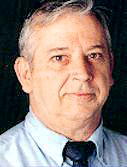Former Secretary of State George Shultz talked with Charlie Rose a few weeks ago and said this, or words to this effect, in defense of pre-emptive war.
"Well, if you knew someone intended to kill you and had the means to do so, you wouldn’t wait until they attacked. That would be silly," said the grand pooh-bah of the Eastern Establishment.
Sounds sort of logical, but there’s a big hitch. If you or I actually followed his advice and pre-emptively killed somebody we knew planned to kill us, we would be arrested, charged with first-degree murder and convicted. The law of no country that I know of condones pre-emptive murder.
And international law, toothless though it is, does not condone or permit pre-emptive wars. The problem with pre-emptive wars, which are now the doctrine of the U.S. administration, is that such wars are necessarily based on intelligence.
And if we have learned nothing else from the Iraq debacle, it is that intelligence can be way off the mark. It doesn’t matter that the intelligence agencies of the United States, Great Britain and Israel all agreed that Saddam Hussein had weapons of mass destruction. The fact, as we have so far discovered on the ground, is that he did not. In a backhanded way, the Bush administration now admits this by trying to dream up other reasons why we went to war.
Americans need to better understand intelligence. It is an amoral and sleazy business and much more imperfect than you would think from reading the novels of Tom Clancy. Let’s look at how intelligence agencies gather information.
First, you can translate and read books and periodicals published in the target country. Second, you can take satellite photographs of the country. Third, you can intercept some electronic communications. And finally, you can develop human spies.
Satellite photographs can’t penetrate forests, caves or roofs. The volume of electronic intercepts is such that by the time you translate and transcribe them, you are several weeks behind. Furthermore, everybody in the world today knows that satellites can be tracked precisely, and thus people can time any movements they wish to keep secret. Everybody knows about electronic intercepts, so they watch what they say.
As for human spies, you have to recruit traitors. Now, people will betray their own countries for different reasons. Some are blackmailed into doing so. Some will do it for the money. Some might do it for ideological reasons. All of them, once they take that first step, will try to tell you what they think you want to hear. The reason is plain: Once they betray their own country, you have them by the tender parts. If they are caught, they die; their only hope of escape is you, the spy handler. That’s why even human intelligence cannot be regarded as gospel. The same applies to defectors.
All I’m saying is that intelligence is imperfect. Spy agencies gather all kinds of bits and pieces of information and then try to analyze them and draw conclusions. But essentially they deal in educated guesses, not in scientific certainties, and quite often their sources are tainted by self-interest and sometimes might be giving deliberate disinformation.
Furthermore, the spy agencies themselves are often pressured to tell their political bosses what they want to hear. That seems to be one of the sins of the current administration. It put uncommon pressure on the CIA to find evidence to justify the policy already adopted.
What is practically impossible to learn is what the true intentions of the leaders of other countries actually are. Russia and China in particular have made a specialty of strategic deception. Also, penetration of terrorist cells is extremely difficult, if not close to impossible.
War is too important a step to take based on nothing more than intelligence briefings, the advice of Mr. Shultz notwithstanding. He has, by the way, always reminded me of the cartoon character Droopy.
 Charley Reese has been a journalist for 49 years, reporting on everything from sports to politics. From 1969—71, he worked as a campaign staffer for gubernatorial, senatorial and congressional races in several states. He was an editor, assistant to the publisher, and columnist for the Orlando Sentinel from 1971 to 2001. He now writes a syndicated column which is carried on LewRockwell.com. Reese served two years active duty in the U.S. Army as a tank gunner.
Charley Reese has been a journalist for 49 years, reporting on everything from sports to politics. From 1969—71, he worked as a campaign staffer for gubernatorial, senatorial and congressional races in several states. He was an editor, assistant to the publisher, and columnist for the Orlando Sentinel from 1971 to 2001. He now writes a syndicated column which is carried on LewRockwell.com. Reese served two years active duty in the U.S. Army as a tank gunner.



